The Trump Supporter’s Error
The mistake that Donald Trump’s admirers and defenders have consistently made since 2015 may be reduced to one fundamental error of confirmation bias: They saw his flouting of ordinary party politics, ordinary presidential rhetoric, ordinary administrative state regulations, and ordinary Republican establishment conciliation, as evidence that he saw the corruption of modern American politics the way they did, and that he was standing up for them and with them against the machine, or the “deep state” as they like to call it.
What they so fatefully (and somewhat willfully) failed to recognize, in spite of the seemingly endless proof blazing before their eyes every day of his campaign and his term in office, was that the reason he flouts these norms is not because he sees them as dangerous or anti-American, but simply because it is of the essence of his character to flout all norms — which, by definition, means not merely the norms his admirers didn’t like either, but also all the ones they ought to have liked, and presumably did like, before the adoration of Trump forced them to don their moral and intellectual blinders of convenience.
When Trump infamously said, during a reality television interview taping, that women would let him “grab” them any way he liked because he was rich and famous, he was telling the world who he is. When he said, even more infamously, days before the 2016 Iowa caucus, that he would not lose any of his followers if he shot a man on Fifth Avenue, he was shouting his true character through a megaphone. He would not only flout the norms of the deep state. He would flout the norms of human decency and mature behavior. He would flout the respect and gratitude with which statesmen traditionally speak to, and of, their supporters. He would flout the “buck stops here” sense of honor and personal responsibility that defines not only proper presidential comportment, but more generally proper manhood. He would flout longstanding and important American alliances and agreements in the name of kowtowing to dictators whose power he admired. He would flout the experience and advice of even the most serious people he himself appointed, both before and after firing them, if they dared to oppose or question his wishes or whims about anything falling within their range of vastly superior knowledge. He would flout the electoral college system (while simultaneously flouting the popular vote), flout the results of a national election, and flout the considered judgments of anyone, including people who began with the agenda of supporting his stolen election fantasy world, who dared to conclude that his claims were bogus and wholly unsubstantiated. He would flout states’ rights by actively pressuring state officials to manufacture votes in order to support his fantasy world. He would flout the U.S. Constitution by demanding that his own vice president use his ceremonial role of certifying the states’ electoral votes to overturn an election result in his favor, in spite of everyone with a functioning brain stem being able to see that this would be an absolutely incendiary violation of the Constitution itself. He would flout the basic concepts of loyalty and good faith dealing, by igniting his angry crowd to violent hatred of said vice president, calling him a coward and a failure who was afraid to “do the right thing,” namely burn the Constitution for the love of Donald Trump, and by subsequently refusing for hours to speak out against the violence and chants of “Hang Mike Pence” being carried out in his name. And he would flout the fundamental republican principle of the rule of law by stealing sensitive national security documents, which are by definition government property and not private possessions, and then refusing to relinquish them from his personal residence after his presidency was over.
There is, in a word, nothing Donald Trump would not flout, if at any moment he happened to judge such flouting as being to his personal advantage in some way. He has all but announced this fact about himself from the rooftops for years, both in his rhetoric and in his behavior. But those who put the confirmation bias blinders on themselves early in the game simply refused to see it, and many of them still refuse. They hear him spouting off his childish invective against things they don’t like, and cheer, as though he were not also and with equal childishness spouting off against a hundred things they do like, or would like if they had not long since narrowed their own field of vision to a single point of fading orange light.

